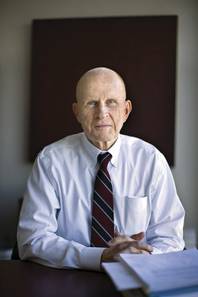Thursday, Aug. 25, 2011 | 5:39 p.m.
Sun Archives

Scott Smith
A UNLV research institute that got off to a rough start but later became instrumental in helping Southern Nevada law enforcement agencies and resorts prepare for terrorist threats ironically is shutting down just days before the 10th anniversary of the 9/11 attacks.
The Institute for Security Studies, which relied on government grants rather than state university funds, is closing its doors Sept. 8 because its revenue dried up. The Nevada System of Higher Education Board of Regents plans in December to discuss the closing but that is considered a mere formality.
The institute announced on its website Aug. 16 that “in an unanticipated decision made by the UNLV hierarchy, we at the Institute for Security Studies have been authorized to declare victory, effective September 8th.”
But departing Executive Director Scott Smith, a retired Army major general, wouldn’t discuss the details behind that decision.
“We are being organizationally dismantled,” Smith said Wednesday. “It’s something I don’t care to talk about. We’re just a group of people who have tried to support the security of Southern Nevada. But our time has passed.”
UNLV spokeswoman Afsha Bawany said the university is “saddened to see any program or institute close.”
“The (institute) has been a valuable partner to many counterterrorism and public safety agencies locally and statewide and has played a role in UNLV’s community outreach efforts,” she said.
The closing will cost three professional staffers their jobs while a clerical worker will be transferred elsewhere on campus.
On the day its doors close, the institute is still scheduled to be a co-sponsor of a panel discussion open to the public on the topic “9/11, 10 Years and Counting” from 4 to 5 p.m. at the UNLV Foundations Building.
The institute, founded in 2003 with the blessing of Senate Majority Leader Harry Reid, D-Nev., aimed to become a leading think tank on homeland security. It began with a staff and associates that could have played themselves in a spy movie.
Its founding director, Lee Van Arsdale, was a former Delta Force commander and Defense Department counterterrorism chief. Other early staffers included a former undercover CIA operative, a special forces expert who participated in the unsuccessful attempt to rescue American hostages in Iran, a counterterrorism consultant who helped design security for American embassies in Moscow and Beijing, a former United Nations weapons inspector and an engineer who worked on imaging mechanisms that could see through walls. Many had connections with the Nevada Test Site.
But with their work shrouded in secrecy this collection of talent had little to show for nearly $9 million in funding, most of it federal money, that was received by the institute in its first three years. The institute boasted that it developed an eight-hour training course on terrorism preparedness for law enforcement offices. But many of its initial objectives, such as a study of the relationship between terrorism and the Internet, were never pursued.
After a 2006 Las Vegas Sun expose of the institute’s shortcomings that prompted an Energy Department investigation and internal UNLV audits, one-third of the institute’s staff was terminated. One university audit concluded that the institute kept shoddy records and ran a rudderless counterterrorism program without direction or focus. Then-UNLV President David Ashley pledged to bring accountability to the institute, and Smith was hired to correct deficiencies.
Under Smith’s guidance, the institute became more focused on helping to develop and manage counterterrorism programs for Metro Police, the Southern Nevada Counter-Terrorism Center and the resort industry through Homeland Security Department grants.
Among the institute’s accomplishments was production of a 15-minute training video for resort employees called “7 Signs of Terrorism,” with more than 12,000 copies issued.
As late as Aug. 3, Smith wrote for the institute’s website as though its future was bright, noting that it was helping educate the public on how to spot and report suspicious activity to authorities. He paid particular tribute to the institute’s role in helping law enforcement create the counterterrorism website www.snctc.org, which informs the public on ways to recognize suspicious activity and gives them a portal to submit reports to police.
“Let’s all strive to keep Nevada the safest and most secure state in America!” Smith wrote.
The Homeland Security grants received by the institute were passed through the Nevada Homeland Security Commission, Clark County’s office of emergency management and Metro Police. Jim Wright, deputy director of Nevada’s Public Safety Department and interim chief of emergency management and homeland security for the state, said Thursday that the commission recently inquired whether the institute was following federal guidelines on how to spend the money.
“We didn’t want any surprises to hit us,” said Wright, who added that the state would have been responsible to repay any federal grant money that had been misspent. “We were just making sure compliance obligations were being met.”
Although he said the commission never received a definitive answer on its inquiry, Wright said any decision to cut off funding from the institute would have been made “locally,” not by the state commission. Calls for comment from county and Metro officials weren’t returned.

Join the Discussion:
Check this out for a full explanation of our conversion to the LiveFyre commenting system and instructions on how to sign up for an account.
Full comments policy